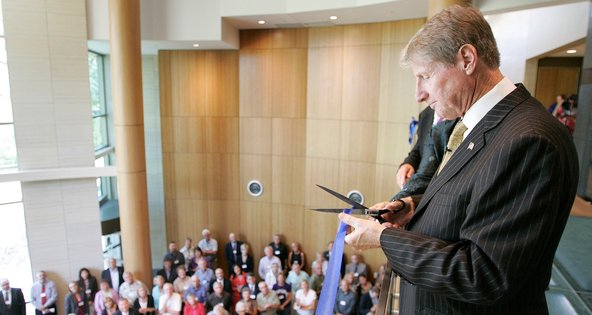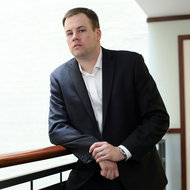 Rick Tibbott/Waterloo Courier, via ReutersRussell Wasendorf in 2009 at the Cedar Falls headquarters of the Peregrine Financial Group.
Rick Tibbott/Waterloo Courier, via ReutersRussell Wasendorf in 2009 at the Cedar Falls headquarters of the Peregrine Financial Group.
2:18 p.m. | Updated CEDAR FALLS, Iowa—It was a triumphant moment in 2009 when a delegation of Iowa lawmakers visited here to tour the gleaming, new headquarters of the Peregrine Financial Group.
“This is impressive,” Charles E. Grassley, the Republican senator from Iowa, said, admiring the futures trading firm’s state-of-the-art facility. “This is a company that’s on the top of things.”
Today, the only impressive thing about Peregrine is the depth of its problems. After a suicide attempt by its founder on Monday, regulators discovered about $215 million in customer money was missing. The Commodity Futures Trading Commission filed a lawsuit charging fraud. Criminal authorities are investigating. Peregrine has filed for bankruptcy and shut down.
On Friday, Russell Wassendorf, a prominent futures industry executive and the founder of Peregrine, was arrested on charges of making false statements to regulators. He was set to appear in federal court later in the day in Cedar Rapids, Iowa.
As Mr. Wasendorf faces criminal charges, Peregrine’s angry customers are asking how futures industry regulators could have missed another potential fraud. The scandal comes just months after MF Global, the defunct futures brokerage firm, lost more than $1 billion in clients’ money.
It now appears that regulators missed the red flags for years.
 Peter Wynn Thompson for The New York Times“The customers are just heartbroken over what happened,” said Tom Power, a broker.
Peter Wynn Thompson for The New York Times“The customers are just heartbroken over what happened,” said Tom Power, a broker.
In 2004, a Peregrine client sent a letter to the National Futures Association, the firm’s primary regulator, and the C.F.T.C., asking it to intervene to prevent the firm from misusing its customers’ money, according to a person with knowledge of the correspondence and a copy of the letter obtained by The New York Times. Five years later, a tipster wrote to the N.F.A. asking it to review Peregrine’s bank account information for accuracy, according to people briefed on the matter who spoke on the condition of anonymity because the investigation was private. The tip was anonymous, and it is unclear how seriously the N.F.A. took it.
The auditor for Peregrine was a one-person shop run out of the accountant’s home in Glendale Heights, Ill., a Chicago suburb. As part of its investigation, the C.F.T.C. is looking into the role that the individual played, according to a person with knowledge of the case.
After the collapse of MF Global, the C.F.T.C. ordered a review of all futures firms to ensure the safety of customer money. The N.F.A. — where Mr. Wasendorf serves on an advisory committee — gave Peregrine a clean bill of health in January.
Government regulators are examining whether Mr. Wasendorf doctored bank statements provided to the N.F.A., according to people briefed on the matter who were not authorized to speak publicly because of the investigation. Authorities are also expected to question officials at U.S. Bank, which held the client’s money.
“The entire industry is outraged that it happened the first time, let alone a second time,” said Michael V. Dunn, a former commission of the C.F.T.C., referring to the collapse of two brokerages. “We need to do something about this.”
The N.F.A. declined to comment. Calls to Peregrine’s auditor were not immediately returned.
For Tom Power, a former MF Global broker, it is hard not to take the brokerage scandals personally.
After losing his job when MF Global went bust, Mr. Power, 31, started his own business. He has spent the last eight months signing up clients still circumspect about their losses at MF Global. For his new venture, he chose to clear his trades through Peregrine, which is commonly known as PFGBest.
“The customers are just heartbroken over what happened,” Mr. Power said. “To have to call these same guys that were with me at MF and tell them it happened again? It’s just devastating.”
Futures firms like Peregrine match buyers and sellers of contracts for commodities like wheat and oil, charging a thin commission for the service. Farmers and others use such contracts to protect themselves from large price fluctuations.
Speculators also play the futures market and they, too, have been burned. Mark Tucker, a part-time investor, has had the misfortune of dealing with both MF Global and PFGBest.
“You’re prepared to take risks,” said Mr. Tucker, who lost about $80,000 between the two firms. “But you don’t expect risks to come from money being stolen out of your account.”
Peregrine’s problems have also rocked Cedar Falls, a small town of about 40,000. An Iowa native, Mr. Wasendorf came here in the late 1960s to attend the University of Northern Iowa. He started a commodities trading business in 1967 in the basement of his Cedar Falls home. Eventually, the business moved to Chicago, the epicenter of the futures markets.
But during the middle of the last decade, Mr. Wasendorf decided to move Peregrine’s headquarters to Iowa. He persuaded many of his employees to move with him, promising a cheaper cost of living and a better quality of life. To entice them, he spent about $15 million on a new building adjacent to the exclusive Beaver Hills Country Club on the outskirts of town. The offices had a day care center with an outdoor playground, a Montessori school for the employees’ children, and free breakfast and lunch for the firms’ nearly 150 workers.
With the broad smile and clean-cut looks of a television news anchor, Mr. Wasendorf, 64, is a rock star in Cedar Falls. He has given generously to his alma mater, recently making a $2 million pledge to the school’s athletic program. His Peregrine Charities organizes a popular annual triathlon in town. Scheduled for next month, the race has been canceled “due to the recent emergency events,” according to the charity’s Web site.
Mr. Wasendorf has eclectic business interests beyond Peregrine, like a publishing company, and a real estate operation in Bucharest, Romania.
In Cedar Falls, he is best known as a restaurateur. When he moved Peregrine’s headquarters here, he opened an upscale Italian restaurant called My Verona, a name paying tribute to the Northern Italian town. The restaurant has been closed since Monday.
Mr. Wasendorf lives extravagantly. Though his primary residence is in Cedar Falls — a compound carved out of Iowa farmland on the outskirts of town — he regularly flew his private jet for meetings in Chicago, where his son ran the business. Employees jokingly referred to the plane as Air Wasendorf. He flew around the world to attend Lady Gaga concerts.
Adding to the mystery surrounding Peregrine’s collapse, Mr. Wasendorf had invited friends and employees to his wedding on Aug. 4, to be held at a Lutheran church in Cedar Falls with a reception at My Verona.
But records show that he married his fiancée, Nancy Paladino, who works in his restaurant business, at a chapel at the Bellagio Hotel in Las Vegas on June 30. Friends say he had planned to hire the band Styx to perform at the wedding, though the band declined.
Just nine days after his wedding, the local police found Mr. Wasendorf, the head of the firm, unconscious in his car behind the building with a tube running from the exhaust pipe into the car’s interior. An empty bottle of vodka rested by his side. He left a suicide note suggesting financial crimes had been committed.
“This whole thing is a shock,” said Jon Crews, the Cedar Falls mayor.
Beneath the surface there were signs of trouble.
In late May, the Wasendorfs hosted their annual brokers’ meeting in Cedar Falls. Brokers from across the country descended on the town, where they enjoyed beef Wellington and an open bar at My Verona. But by that time, employees had been told they would face a 10 percent pay cut in June, followed by another 10 percent cut the following month, according to employees and firm memos. Mr. Wasendorf also canceled the annual employee picnic, telling staff members that they would be invited to his reception.
Around the same time, Mr. Wasendorf boasted of a new restaurant he planned to open in neighboring Waterloo, to be called My Verona 2. Some employees wondered how Mr. Wasendorf could afford such expenditures when he was cutting their pay.
The brokerage firm started to unravel recently.
The N.F.A. was in the middle of changing part of its audit process to an online platform, where bank statement information would feed directly to the regulator. This month, Peregrine was facing its first audit under the new system, called confirmation.com, and Mr. Wasendorf was opposed to the system, according to people with knowledge of the matter.
He fought the directive for several days, the person said, until relenting on Sunday. The N.F.A. started getting confirmations through the system Monday morning.
As for the industry itself, lawmakers were already considering a move to crack down on futures firms after the MF Global fiasco. Now many participants are hoping the outrage will bolster those efforts.
Futures firms, anxious about the impact of the Peregrine collapse, are considering lining up for a voluntary audit to reassure clients, according to people familiar with the effort.
On Thursday, Mr. Grassley asked his colleagues on the Senate’s agriculture committee to address the Peregrine scandal at a hearing next month. He also requested that the C.F.T.C. provide information on what it did in response to red flags at Peregrine.
“People need to have confidence in our commodity trading system in order for it to work for farmers and investors the way it’s intended,” Mr. Grassley said.
Article source: http://dealbook.nytimes.com/2012/07/12/at-peregrine-financial-signs-of-trouble-seemingly-missed-for-years/?partner=rss&emc=rss